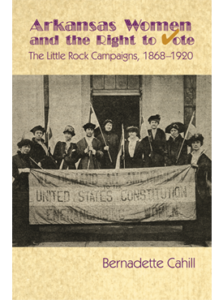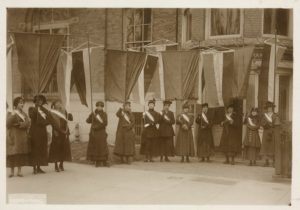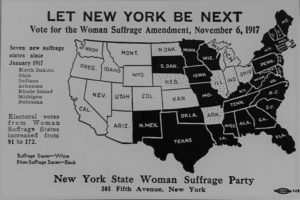calsfoundation@cals.org
Did Your Ancestor Work for Women’s Right to Vote?
Guest post by Bernadette Cahill:
The campaign to win women the right to vote under the U.S. Constitution, beginning in 1848, was the longest such civil rights struggle in American history. The campaign culminated with the ratification of the 19th Amendment in 1920—seventy-two years after it began.
Arkansas women played a role in this enormous struggle for women’s suffrage, with interest documented in Little Rock beginning in 1870 and the first Arkansas Woman Suffrage Association that Lizzie Dorman Fyler founded in Eureka Springs in 1881. In expanding family history, therefore, it is worth investigating the possible involvement of any ancestors in this movement.
 When I was researching what women did in Little Rock for suffrage, which was the basis for my book Arkansas Women and the Right to Vote: The Little Rock Campaigns (Butler Center Books, 2015), I compiled lists of the women whose names appeared in suffrage stories in Little Rock’s newspapers, the Democrat and the Gazette.
When I was researching what women did in Little Rock for suffrage, which was the basis for my book Arkansas Women and the Right to Vote: The Little Rock Campaigns (Butler Center Books, 2015), I compiled lists of the women whose names appeared in suffrage stories in Little Rock’s newspapers, the Democrat and the Gazette.
These two lists, available as searchable pdfs online on the CALS Roberts Library website, are arranged alphabetically and in date order.
I have since then moved on to other aspects of the woman’s suffrage and equal rights struggles and rarely refer to these files. Therefore, rather than have them sit unused, I have now made them available to a wider audience through CALS. They are a kind of index to potential mentions of an ancestor’s name in a historical document for a specific event. In some cases, the newspaper stories give even more information in addition to attendance of a suffrage event.
Even if you have never heard of any family tales about suffrage, these files are worth checking—especially if you have a long Arkansas heritage. I compiled them before the Democrat and Gazette were searchable online through Newspapers.com, and they can provide specific information to make even an online newspaper hunt easier.

It is worth researching suffrage for women in your family history because the campaign was not only very long, but the movement was large and its membership and participants were women. The National American Woman Suffrage Association (NAWSA) had about two million members by the time of victory. The younger National Women’s Party had a maximum of 60,000 but was the group that pushed suffrage over the top on the solid foundation that the NAWSA had created.
Besides these two national organizations, women in many states formed state and local societies and conducted state suffrage campaigns. Little Rock had the Political Equality League, founded in 1911, for example, and the NWP had a local branch in Little Rock later. Women from other towns joined in.
The biggest problem is the unique hurdle that genealogists and historians of women always face: changing names. It is important to have the correct name of the woman being researched between 1900 and 1920, for women almost always changed their surname through marriage—possibly more than once. They may have been single when participating in the campaign, or they may have been married or widowed: in any case, name changes are something to consider.
 These lists do not cover everything. Before 1900, the information was sparse and considerably less unwieldy, so I compiled the lists only from 1900 onward. Also, to my knowledge, all the names are of white women. This is a result of newspaper reports. Black women were sometimes active in suffrage efforts, but my research yielded almost no information. Only one Black suffragist, Sarah H. Henley, came up, and she died in 1892.
These lists do not cover everything. Before 1900, the information was sparse and considerably less unwieldy, so I compiled the lists only from 1900 onward. Also, to my knowledge, all the names are of white women. This is a result of newspaper reports. Black women were sometimes active in suffrage efforts, but my research yielded almost no information. Only one Black suffragist, Sarah H. Henley, came up, and she died in 1892.
By November 1917, about half the country had some measure of state women’s suffrage. That year, Arkansas women had won the right to vote in primaries. The national inequalities these widespread developments created were glaring. Three Arkansas women—Florence Lee Brown Cotnam (aka Mrs. T. T. Cotnam), Josephine Miller, and Gertrude Watkins—participated in 1917’s triumphant suffrage campaign in New York.
Pauline Floyd, a native of El Dorado, participated in the first NWP picket. The NWP journal, The Suffragist, later featured a profile of her.
The New York victory added to the pressure of the NWP’s picketing to tip an obdurate President Wilson’s hand. In January 1918, Wilson finally decided to support women’s suffrage. This was pure expediency, but women can be thankful for small mercies.
The 19th Amendment is based on the wording of the 15th Amendment, which women had campaigned for inclusion in during the late 1860s. It stated, The right of citizens of the United States to vote shall not be denied or abridged by the United States or by any State on account of sex. It also included an enforcement clause.
The amendment added to the Constitution—in voting matters only—the one word “sex,” which lawmakers deliberately left out of the 1870 15th Amendment. If they had included it then, women would have been saved a lot of time and money, and it would have changed the course of history. Women still await equal rights under the Constitution in other matters.
These lists may provide evidence of the truth of vague stories of an ancestor’s participation in suffrage, though further information may be hard to find. The benefit of referring to newspapers to follow up on a name found in the list is that newspapers not only give you a great feel for the times, but also provide the broader context in which your ancestor took part to win the vote.
To find an ancestor involved in even a small way with the first-ever successful non-violent political campaign in U.S. history is something to be proud of. I would love to hear if these lists have helped you.
By Bernadette Cahill
Cahill is author of Arkansas Women and the Right to Vote: The Little Rock Campaigns, 1868–1920 (Butler Center Books, 2015) and other books about votes for women. She and her three siblings appear to be the last living children of a British suffragette. She lives in historic Vicksburg, Mississippi.
***
For deep dives into the subject of women’s suffrage, check out the new CALS Women’s Suffrage Book Club, a monthly book discussion series from April 2022 through August 2022 focusing on texts about the Women’s Suffrage Movement in the United States. Each of the five sessions, held virtually on Zoom and live streamed through the CALS YouTube channel, will include a brief presentation by a local scholar followed by a discussion of a book. Participants are welcome to attend any or all of the monthly book discussion groups, registering for each individually. More info. here.




